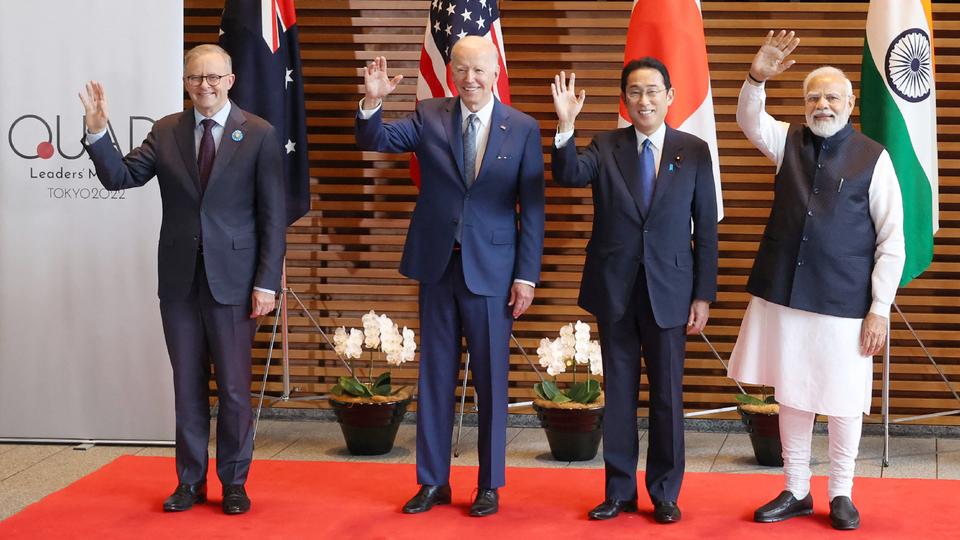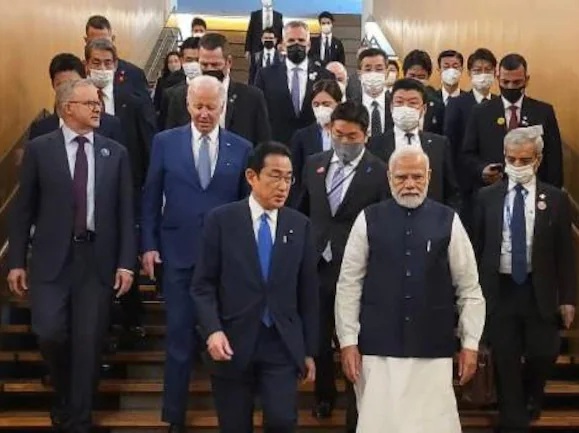|
Getting your Trinity Audio player ready...
|

QUAD as it is, today stands in a turbulent environment following the Russia-Ukraine war. Many had suggested the relevance of QUAD going down but it seems like always, nothing is too predictable in international relations. However, while supporters celebrate the obvious optics, there is more to it.
The USA – Their push to isolate Russia has not worked that well outside of the Euro region. Much like the same understanding drawn on blanks, the US has now finally admitted and decided not to push India repeatedly over its relationship with Russia. Both gains from this as QUAD or the anti-China Indo Pacific retains its relevance and the bilateral ties between them remain robust. The US now intends to reduce the Indian dependence on Russian tech while also enduring New Delhi’s national interest-driven foreign policy.
Japan – Not much stability has been found since Shinzo Abe resigned. Japan had to change two heads of state in the process while battling successive waves of COVID as well. Japan’s relationship with India remains strong as they signed more trade deals a few weeks ago. The Japanese more or less remain coy over the idea of letting go of their clause of no maintenance of a said military as China grows and continues to prod around Taiwan and the South China sea. But one setback they had was when Russia invaded Ukraine, the Japanese were forced to reconsider their negotiations around the Kuril islands dispute with both sides not wishing to negotiate and talk over the dispute. Hence the QUAD summit comes at a time the Japanese are considered and seen as a counter-weight to the Chinese by some observers in East Asia. It remains however to be seen if Washington is willing to help and invest in making that choice, knowing very well that historically, Japan is and was the power that knew how to contain China but was largely ambitious in its progress.
The QUAD summit comes at a time the Japanese are considered and seen as a counter-weight to the Chinese by some observers in East Asia.
Australia – Fresh from an election where the Conservative and open critic of China, Scott Morrison lost and the left-leaning candidate won. Anthony Albanese has a tough task on him to not only turn around the domestic mood that went against the mismanagement of Morrison’s administration but also address new realities of the global order. Much of the Australian bit with its natural euro allies soured during AUKUS, especially the French crying foul until the Americans doused the fire and coincidentally, the Russian operation on Ukraine started. From there, everything was the same but then, the news of the Solomon Islands signing a defence treaty with China worried the Australians and the Americans a lot. Oceania is a contested area for influence and both China and America have their hands full. Some blamed the lack of awareness by the Aussies to predict this and thus, this new meeting and the Indo-Pacific economic framework is the direct response by Washington. Naturally, QUAD was already in it and it is down to the new PM to juggle his obvious non- antagonist attitude towards China and the new economic group.
India– The only nation that perhaps can gain if it stays or leaves the QUAD. Yes, you read that right. It has nothing to lose. The approach before the whole crisis in Ukraine added to its bilateral progress with both Australia and Japan, has not only forced Washington to reconsider its policy towards India but also wholeheartedly praise and subtly criticise it using its vast PR network. The Indian side has done well so far in balancing their ties with Russia and the West while making sure their stance towards Chinese build-up is checked. But, having said that, India now is focused on helping Sri Lanka as well as having more ties with other nations around the Indo – Pacific as well as the Nordic side to continue their counter to the said Chinese influence around their geographic position as well as the world.
India's bilateral progress with both Australia and Japan, has not only forced Washington to reconsider its policy towards India but also wholeheartedly praise and subtly criticise it using its vast PR network.

India needs to, however, make more policy changes to completely replace China or be widely courted as the alternative to the dragon. So far, that is something New Delhi tremendously focuses on. The next aspect that the Indian side should do is convince Washington to reduce its defence against China. China accounts to have the largest trading partner with the US and much of QUAD or even the IPEF is redundant if the Americans sing different tunes altogether. Hence, India has the choice of preparing its slow strategy to get more investment here and reduce the Chinese-American trade bonhomie. If this fails, then both of these projects will ultimately remain toothless and ineffective to a large extent.
Supporters of QUAD should not jump the gun too soon. This is more about targeting Russia and China than admitting their faults to the lackadaisical American approach. Nevertheless, the American push is coming at an interesting moment and whatever happens, remains to be seen.
(Anhad is a postgraduate scholar in international relations. He has an undergraduate degree in history. He is a columnist for many portals and is a keen public speaker in debates and discussions. Views expressed are the author’s own)

